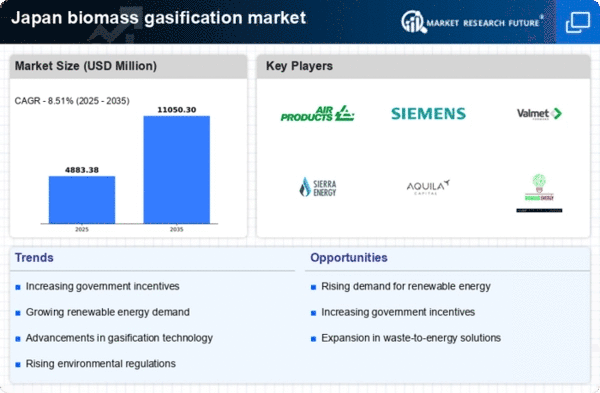Rising Energy Demand
The increasing energy demand in Japan is a crucial driver for the biomass gasification market. As the nation seeks to diversify its energy sources, biomass gasification presents a viable alternative to fossil fuels. In 2025, Japan's energy consumption is projected to rise by approximately 1.5% annually, necessitating innovative solutions to meet this demand sustainably. The government has recognized the potential of biomass gasification, which can convert organic materials into syngas, providing a cleaner energy source. This shift is expected to enhance energy security while reducing reliance on imported fossil fuels. The biomass gasification market is likely to benefit from this trend, as it aligns with Japan's long-term energy strategy aimed at achieving carbon neutrality by 2050.
Waste Management Solutions
Japan faces significant challenges in waste management, with a substantial portion of its waste being organic. The biomass gasification market offers an effective solution to this issue by converting waste into energy. In 2025, it is estimated that Japan generates over 40 million tons of organic waste annually, much of which could be utilized in gasification processes. This not only helps in reducing landfill usage but also contributes to energy production. The integration of biomass gasification into waste management strategies is likely to gain traction, as municipalities seek sustainable methods to handle waste while generating energy. This dual benefit positions the biomass gasification market as a key player in addressing Japan's waste management crisis.
Public Awareness and Acceptance
Public awareness regarding environmental issues and renewable energy is growing in Japan, which positively influences the biomass gasification market. As citizens become more informed about the benefits of renewable energy sources, there is an increasing acceptance of biomass gasification as a viable alternative. Surveys indicate that over 70% of the population supports the transition to renewable energy, with a significant portion recognizing the role of biomass in achieving sustainability goals. This shift in public perception is likely to encourage local governments and businesses to invest in biomass gasification projects. The increasing demand for clean energy solutions is expected to drive the biomass gasification market, as stakeholders respond to the public's call for sustainable practices.
Support for Renewable Energy Projects
The Japanese government is actively promoting renewable energy projects, which significantly impacts the biomass gasification market. With initiatives aimed at increasing the share of renewables in the energy mix, the government has set ambitious targets for biomass energy production. By 2025, Japan aims to generate approximately 10% of its electricity from biomass sources. This supportive regulatory environment encourages investments in biomass gasification technologies and infrastructure. Financial incentives, such as feed-in tariffs and subsidies for biomass projects, are likely to stimulate market growth. As a result, the biomass gasification market is positioned to expand, driven by government backing and a commitment to sustainable energy solutions.
Technological Innovations in Gasification
Technological advancements in gasification processes are propelling the biomass gasification market forward in Japan. Innovations such as improved gasifier designs and enhanced feedstock conversion techniques are making biomass gasification more efficient and cost-effective. In recent years, the efficiency of gasification systems has improved, with some systems achieving conversion efficiencies of over 80%. These advancements not only lower operational costs but also increase the attractiveness of biomass gasification as a renewable energy source. As Japan continues to invest in research and development, the biomass gasification market is expected to see a surge in new technologies that enhance performance and reduce emissions, aligning with the country's environmental goals.
















